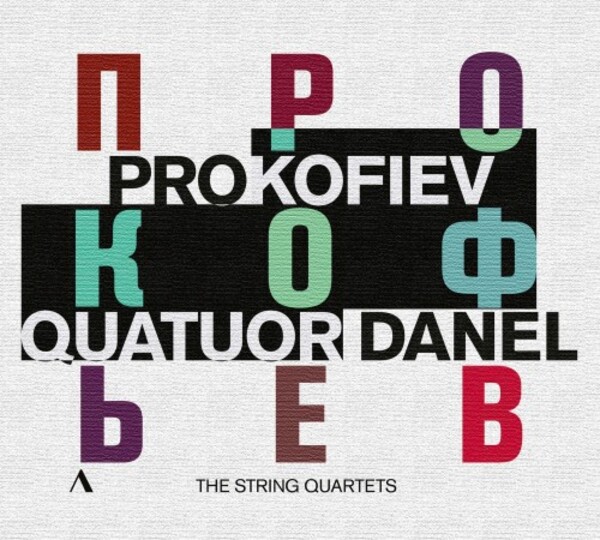PROKOFIEV String Quartets. Visions Fugitives (Quatuor Danel)
View record and artist detailsRecord and Artist Details
Genre:
Chamber
Label: Accentus
Magazine Review Date: 05/2025
Media Format: CD or Download
Media Runtime: 66
Mastering:
DDD
Catalogue Number: ACC30640

Tracks:
| Composition | Artist Credit |
|---|---|
| String Quartet No. 1 |
Sergey Prokofiev, Composer
Danel Quartet |
| String Quartet No. 2 |
Sergey Prokofiev, Composer
Danel Quartet |
| (20) Visions fugitives |
Sergey Prokofiev, Composer
Danel Quartet |
Author: Marina Frolova-Walker
Quatuor Danel have already produced admirable sets of all the Shostakovich and Weinberg quartets, so I was naturally intrigued to hear their take on Prokofiev’s quartets. Prokofiev and Shostakovich, at the top of the Soviet musical hierarchy, where like a divorced celebrity couple – outwardly civil but deeply disapproving of each other. Prokofiev squirmed at the raw emotion and melodrama in so much of Shostakovich’s work. Shostakovich was dismayed at the dramatic blunders Prokofiev made in his operas. While they stood at opposite poles, Shostakovich had also learnt much from the music of the older Prokofiev (there were 15 years between them).
The Danel certainly play Prokofiev in their own inimitable way, deeply thought out and coherent. I struggled a little with their First Quartet, which to my mind is neoclassical and ‘Apollonian’, even though there are some harsher moments. The Danel, instead, reconceive the quartet as driven and disturbed (especially in the first movement and the Scherzo’s Trio section). The dissonances are heightened, and consonances dynamic instead of reposeful. Their approach is certainly engaging, but by the Andante finale it becomes hard to square it with the score. This movement surely needs some calm and simplicity, and its textures cry out for traditional cantabile plus accompaniment: this way it can rise to a serene beauty, as the Pavel Haas Quartet managed in their 2009 recording. The Danel add their subtle and personal touches, but they seem so intent on subversion that the movement can no longer perform its difficult function, namely an Andante that also rounds off the whole quartet.
The Second Quartet was written during the war, when Prokofiev was taken out of harm’s way to the Kabardin-Balkar region, and he takes up local folk tunes in a witty and ironic essay in the folk vein of socialist realism. The Danel have decided to make it mordant and bitter, as if Prokofiev were raising a finger at Stalin. They wring everything they can out of the occasional tangy, dissonant splashes. In the folk quotation of the first movement, they labour the plodding rhythm to turn it into the neoprimitivism of, say, Mosolov (readers can look up his Turkmenian Nights). This took some getting used to, but I think it works on its own terms. Their interpretation of the second movement is mesmerising – there was a distant greeting from Borodin’s ‘steppes’ in the spacious textures, and a wonderful play of timbral colours. For once in this recording, the Danel seem to be reconciled to beauty, and I found it very welcome. The quartet’s great attention to detail pays off well in the finale (there is a breathtaking pianissimo at around 7'25"), and they create an anxiety that would have pleased Shostakovich – perhaps Prokofiev was indeed stepping outside his role here and imitating his rival.
Although Prokofiev only wrote two quartets, the great triumph of this disc is a superb quartet arrangement of the Visions fugitives, a set of 20 striking and memorable piano miniatures written during the First World War and in the early stages of the Revolution. On the piano, they are odd little creatures, sometimes slow, with spare textures, sometimes frantic, sometimes looking back to fin de siècle decadence, but more often serving as first experiments with new compositional techniques. The riveting quartet version originated in an arrangement by Sergei Samsonov but the Danel have added further elaborations. Their highly coloured and characterful playing brings the best out of each piece, and I simply had to go back and hear them all again.
The recorded sound seems to place the listener right in the midst of the performers, and many gorgeous details are perfectly captured, although in the sparer textures of the Visions this closeness becomes risky, allowing some non-musical noises to come through.
Discover the world's largest classical music catalogue with Presto Music.

Gramophone Digital Club
- Digital Edition
- Digital Archive
- Reviews Database
- Full website access
From £8.75 / month
Subscribe
Gramophone Full Club
- Print Edition
- Digital Edition
- Digital Archive
- Reviews Database
- Full website access
From £11.00 / month
Subscribe
If you are a library, university or other organisation that would be interested in an institutional subscription to Gramophone please click here for further information.




